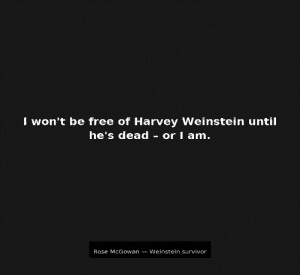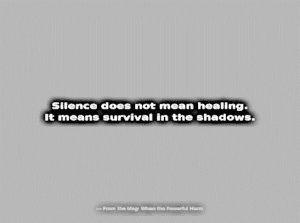Introduction
Trauma leaves scars that do not fade with time. When powerful men cause harm, disbelief, gaslighting, and the weight of institutions that protect themselves magnify the impact. Survivors must not only endure the pain of their experience but also prove their truth in a world that often prefers silence.
Over the past decade, women have spoken out against Harvey Weinstein, Jeffrey Epstein, Donald Trump, Sean “Diddy” Combs, Larry Nassar, and even Prince Andrew. Their voices reveal what unresolved trauma looks like in real life: the sleepless nights, the shame, the nightmares, and the courage it takes to speak.
This blog does not aim to tell their stories for them. Instead, it gathers their words — survivors of powerful men — to show how the patterns of trauma repeat, no matter the perpetrator’s status. These are voices of fear and resilience, shame and defiance. And together, they tell a story society must finally hear.
Living in Fear
Abusers find shelter in wealth, fame, or even royalty, creating a constant shadow of fear. Survivors describe a life of nightmares, re-traumatisation through the media, and the knowledge that their abusers remain insulated by power.


- “I won’t be free of Harvey Weinstein until he’s dead – or I am.” — Rose McGowan, Weinstein survivor
- “I dream about Epstein and Maxwell a lot … Sometimes they’re abusing me. I always wake up wishing I didn’t have to live so much in the past.” — Virginia Giuffre, Epstein and Prince Andrew case
- “He knows what happened. I know what happened. And there’s only one of us telling the truth.” — Virginia Giuffre, BBC Panorama interview about Prince Andrew
- “As soon as I see this stuff in the news, it … pushes me back into a survival mode.” — Courtney Wild, Epstein survivor
Together, these words reveal a haunting pattern: unresolved trauma is not simply personal pain but an ongoing battle against men who remain celebrated or shielded.
Shame and Silencing
Shame is one of trauma’s most corrosive weapons. Survivors of powerful men are often branded opportunists or liars, their pain reframed as consent. Public denial and media attacks deepen the wound, leaving survivors to wrestle with humiliation and silence.

- “When I had the courage to speak out … he defamed my character, accused me of lying for personal gain, even insulted my appearance.” — E. Jean Carroll, Trump case
- “I felt sick inside. I felt horrified … Like many women, I blamed myself.” — Natasha Stoynoff, Trump case
- “There it is a confirmation that Harvey Weinstein derailed my career… I’m just heartsick.” — Mira Sorvino, Weinstein survivor
- “He beat me; he forced me into situations I did not consent to. I lived in constant fear.” — Cassie Ventura, Diddy case
A president mocked Carroll, someone strangled Sorvino’s career, Stoynoff turned blame inward, and someone reframed Ventura’s terror as passion. Diddy’s legal team even described their relationship as a “modern love story,” likening him to a Heathcliff figure — dark, magnetic, tragic. This rebranding of abuse masks violence as romance, turning coercion into consent and pain into poetry.
Trust Betrayed
Abuse by powerful men is not just a violation of the body — it is a betrayal of trust. Many survivors describe how those meant to protect them instead enabled or excused the abuse, shattering their faith in mentors, leaders, or even governments.

- “My career was damaged because I rebuffed Mr Weinstein’s sexual advances. I know it for a fact.” — Ashley Judd, Weinstein survivor
- “This is not our job. We have done our job. We’ve been responsible in reporting, so I want transparency.” — Anouska De Georgiou, Epstein survivor
- “He was like an octopus. His hands were everywhere.” — Jessica Leeds, Trump accuser
The betrayal is double: first by the abuser, then by the structures that enable him. After someone shatters trust in such a public and devastating way, repairing it is difficult.
Denial and Dissociation
For many survivors, the mind shields itself from overwhelming harm by fragmenting memories, numbing emotions, or retreating into denial. When abusers are powerful, this psychological defence collides with cultural disbelief: if she didn’t report right away, if she can’t remember every detail, maybe it didn’t happen.

- “I had not processed it. I had not processed what was going on.” — E. Jean Carroll, Trump case.
- “I was silenced for many years, but I refused to be silenced forever. They knew. The FBI knew. The media knew. And nothing was done.” — Maria Farmer, an Epstein survivor.
- “There were two years where I lost a lot in my life, but I wanted to help others.” — Ambra Battilana Gutierrez, Weinstein survivor.
Dissociation and denial are not proof of dishonesty — they are evidence of harm too big for the mind to hold.
The Cost to the Body and Mind
Trauma does not end with disclosure. It lingers in sleepless nights, chronic illness, nightmares, and the constant weight of vigilance. Survivors of powerful men often describe how their bodies remember the abuse long after society has forgotten the headlines.

- “We cannot heal without justice. We cannot protect the future if we refuse to confront the past.” — Chauntae Davies, Epstein survivor
- “I still have days where I feel like I’m back on that table. I’ll never be fully healed. The scars are always there.” — Aly Raisman, Nassar survivor
- “I dream about Epstein and Maxwell a lot … Sometimes they’re abusing me. I always wake up wishing I didn’t have to live so much in the past.” — Virginia Giuffre, Epstein and Prince Andrew case
- “He beat me; he forced me into situations I did not consent to. I lived in constant fear.” — Cassie Ventura, Diddy case
The cost of trauma is borne in flesh and bone, nervous systems and immune systems. For survivors of powerful men, the body keeps score — long after society moves on.
Conclusion
Unresolved trauma is not weakness. It is the body and mind doing their best to survive the unspeakable — and when the perpetrator is powerful, survival becomes even harder.

The voices of survivors like Virginia Giuffre, Rose McGowan, E. Jean Carroll, Natasha Stoynoff, Mira Sorvino, Ashley Judd, Aly Raisman, and Cassie Ventura reveal the patterns we can no longer ignore shame weaponized against women, careers destroyed for speaking up, nightmares that never end, bodies that carry scars long after the abuse.
Virginia Giuffre’s courage in naming both Epstein and Prince Andrew showed us how power protects itself, even within royalty. Cassie Ventura’s lawsuit showed how violence could disguise itself as love. Rose McGowan, Mira Sorvino, and Ashley Judd exposed how Hollywood silenced women to protect predators. Aly Raisman demanded accountability from institutions that let a doctor abuse hundreds of girls.
Their testimonies echo the same truth: trauma persists, but so does resilience. Healing requires more than individual strength. It requires that we believe survivors, dismantle the structures that protect abusers, and refuse to let image-making or status rewrite violence as romance.
We cannot allow unresolved trauma to remain invisible — because silence does not mean healing. It means survival in the shadows. And it is time to bring those stories fully into the light.
Bibliography
- McGowan, Rose. Interview with The Guardian, 2018.
- Giuffre, Virginia. BBC Panorama interview, 2019.
- Giuffre, Virginia. Interview with The Times, 2021.
- Wild, Courtney. Interview with ABC News, September 2025.
- Carroll, E. Jean. Testimony in Carroll v. Trump, 2023.
- Stoynoff, Natasha. “Donald Trump Assaulted Me, and Then He Publicly Humiliated Me.” People Magazine, 2024.
- Sorvino, Mira. Post on Twitter/X, 2017.
- Ventura, Cassie. Civil lawsuit against Sean Combs, November 2023.
- Judd, Ashley. Quoted in The New York Times, October 2017.
- De Georgiou, Anouska. Interview with ABC News, 2025.
- Leeds, Jessica. Interview with The New York Times, October 2016.
- Farmer, Maria. Interview with The New York Times, 2020.
- Gutierrez, Ambra Battilana. Interview with The Guardian, 2018.
- Davies, Chauntae. Statement at press conference, 2019.
- Raisman, Aly. Interview with CBS News, 2018.
Further Reading
If this blog resonated with you, you may also want to read:
- [Modern Daddy and the Rebranding of Abuse] — how powerful men disguise violence as love, and why society accepts it.
Modern Daddy and the Rebranding of Abuse: When Power Writes the Love Story – Spirit by Naira
- Why They Don’t Report: Silence, Systems, and Survival — unpacking the reasons women and children often stay silent about abuse.
Why the silence, systems, and survival prevent reporting is the question. – Spirit by Naira
- Predators and Prey: A tale of Power and Vulnerability
Predators and Prey: A Tale of Power and Vulnerability – Spirit by Naira
- What if They Were Telling the Truth? Rethinking the Menendez Brothers Through the Lens of Child Abuse — challenging society’s disbelief of survivor testimony.
What If They Were Telling the Truth? – Spirit by Naira
Together, these pieces continue the conversation about unresolved trauma, the abuse of power, and the importance of believing survivors.